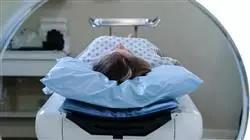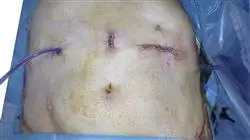University certificate
The world's largest faculty of medicine”
Introduction to the Program
A university program to keep you up to date with studies on colorectal cancer screening”

Early detection continues to be key for cancer patients, despite advances in new technologies and in the treatments subsequently employed for the management of the disease at different stages, the study of this type of cancer continues to be necessary.
However, the proper diagnosis through the different techniques and tools used today mark the quality of life of the oncology patient who suffers from another less aggressive type of cancer. This Postgraduate diploma delves into colorectal cancer, anal canal and non-colorectal digestive tumors from the hand of a specialized teaching team with experience in Oncology in reference hospitals, which will allow the medical professional to be aware of the latest studies in this area.
A teaching designed for medical professionals who wish to renew their knowledge in the different types of digestive tumors, which are very heterogeneous entities, while updating their knowledge in the diagnosis, staging, and treatment of the different stages of colorectal cancer. A 6-month course where, in addition, you will delve into the most significant advances and developments in Radiotherapy. All of this, with multimedia content that can be accessed at any time, either for viewing or downloading for consultation whenever you need it.
A university program offered by TECH, and particularly suitable for medical professionals who wish to combine their work and/or personal responsibilities with an education that is at the forefront of the academic field. In this way, students who take this program completely online will be able to access the syllabus without fixed schedules and with an electronic device (computer,Tablet, cell phone) with an internet connection. In a flexible way, students will be able to distribute the course load according to their needs and without losing the excellent opportunity to update their knowledge in Medical Oncology.
A 100% online program in which you will learn about the future perspectives of treatments and diagnostics in patients with cancer and digestive tumors”
This Postgraduate diploma in Digestive Medical Oncology contains the most complete and up-to-date scientific program on the market. The most important features include:
- The development of case studies presented by medical experts specialized in Oncology
- The graphic, schematic, and practical contents with which they are created, provide scientific and practical information on the disciplines that are essential for professional practice
- Practical exercises where self-assessment can be used to improve learning
- Its special emphasis on innovative methodologies
- Theoretical lessons, questions to the expert, debate forums on controversial topics, and individual reflection assignments
- Content that is accessible from any fixed or portable device with an Internet connection
Cancer patients need professionals who are increasingly prepared and up to date with the latest developments. This program is designed to respond to this demand”
The program includes, in its teaching staff, professionals from the sector who bring to this program the experience of their work, in addition to recognized specialists from prestigious reference societies and universities.
The multimedia content, developed with the latest educational technology, will provide the professional with situated and contextual learning, i.e., a simulated environment that will provide immersive education programmed to learn in real situations.
This program is designed around Problem-Based Learning, whereby the professional must try to solve the different professional practice situations that arise during the academic year For this purpose, the student will be assisted by an innovative interactive video system created by renowned and experienced experts.
The real cases of this program will allow you to access to a recent and practical knowledge in the treatments applied to oncology patients"

Do you want to combine your professional responsibilities with quality teaching? With this program you will be able to access the most updated syllabus whenever and wherever you want"
Why study at TECH?
TECH is the world’s largest online university. With an impressive catalog of more than 14,000 university programs available in 11 languages, it is positioned as a leader in employability, with a 99% job placement rate. In addition, it relies on an enormous faculty of more than 6,000 professors of the highest international renown.

Study at the world's largest online university and guarantee your professional success. The future starts at TECH”
The world’s best online university according to FORBES
The prestigious Forbes magazine, specialized in business and finance, has highlighted TECH as “the world's best online university” This is what they have recently stated in an article in their digital edition in which they echo the success story of this institution, “thanks to the academic offer it provides, the selection of its teaching staff, and an innovative learning method aimed at educating the professionals of the future”
A revolutionary study method, a cutting-edge faculty and a practical focus: the key to TECH's success.
The most complete study plans on the university scene
TECH offers the most complete study plans on the university scene, with syllabuses that cover fundamental concepts and, at the same time, the main scientific advances in their specific scientific areas. In addition, these programs are continuously being updated to guarantee students the academic vanguard and the most in-demand professional skills. In this way, the university's qualifications provide its graduates with a significant advantage to propel their careers to success.
TECH offers the most comprehensive and intensive study plans on the current university scene.
A world-class teaching staff
TECH's teaching staff is made up of more than 6,000 professors with the highest international recognition. Professors, researchers and top executives of multinational companies, including Isaiah Covington, performance coach of the Boston Celtics; Magda Romanska, principal investigator at Harvard MetaLAB; Ignacio Wistumba, chairman of the department of translational molecular pathology at MD Anderson Cancer Center; and D.W. Pine, creative director of TIME magazine, among others.
Internationally renowned experts, specialized in different branches of Health, Technology, Communication and Business, form part of the TECH faculty.
A unique learning method
TECH is the first university to use Relearning in all its programs. It is the best online learning methodology, accredited with international teaching quality certifications, provided by prestigious educational agencies. In addition, this disruptive educational model is complemented with the “Case Method”, thereby setting up a unique online teaching strategy. Innovative teaching resources are also implemented, including detailed videos, infographics and interactive summaries.
TECH combines Relearning and the Case Method in all its university programs to guarantee excellent theoretical and practical learning, studying whenever and wherever you want.
The world's largest online university
TECH is the world’s largest online university. We are the largest educational institution, with the best and widest online educational catalog, one hundred percent online and covering the vast majority of areas of knowledge. We offer a large selection of our own degrees and accredited online undergraduate and postgraduate degrees. In total, more than 14,000 university degrees, in eleven different languages, make us the largest educational largest in the world.
TECH has the world's most extensive catalog of academic and official programs, available in more than 11 languages.
Google Premier Partner
The American technology giant has awarded TECH the Google Google Premier Partner badge. This award, which is only available to 3% of the world's companies, highlights the efficient, flexible and tailored experience that this university provides to students. The recognition as a Google Premier Partner not only accredits the maximum rigor, performance and investment in TECH's digital infrastructures, but also places this university as one of the world's leading technology companies.
Google has positioned TECH in the top 3% of the world's most important technology companies by awarding it its Google Premier Partner badge.
The official online university of the NBA
TECH is the official online university of the NBA. Thanks to our agreement with the biggest league in basketball, we offer our students exclusive university programs, as well as a wide variety of educational resources focused on the business of the league and other areas of the sports industry. Each program is made up of a uniquely designed syllabus and features exceptional guest hosts: professionals with a distinguished sports background who will offer their expertise on the most relevant topics.
TECH has been selected by the NBA, the world's top basketball league, as its official online university.
The top-rated university by its students
Students have positioned TECH as the world's top-rated university on the main review websites, with a highest rating of 4.9 out of 5, obtained from more than 1,000 reviews. These results consolidate TECH as the benchmark university institution at an international level, reflecting the excellence and positive impact of its educational model.” reflecting the excellence and positive impact of its educational model.”
TECH is the world’s top-rated university by its students.
Leaders in employability
TECH has managed to become the leading university in employability. 99% of its students obtain jobs in the academic field they have studied, within one year of completing any of the university's programs. A similar number achieve immediate career enhancement. All this thanks to a study methodology that bases its effectiveness on the acquisition of practical skills, which are absolutely necessary for professional development.
99% of TECH graduates find a job within a year of completing their studies.
Postgraduate Diploma in Digestive Medical Oncology.
Digestive medical oncology is a subspecialty of oncology that focuses on the diagnosis, treatment and prevention of cancers affecting the gastrointestinal tract and other associated organs, such as the liver and pancreas.
Research and analysis aspects for the development of digestive medical oncology.
Diagnosis of digestive cancers: different diagnostic techniques, including endoscopy, computed tomography, magnetic resonance imaging, ultrasound and biopsy, are studied to identify the location and extent of the disease.
Treatment of digestive cancers: different treatment options are studied, such as surgery, chemotherapy, radiotherapy, biological therapy and immunotherapy, to identify and apply the most effective treatment for each patient.
Prevention of digestive cancers: risk factors for digestive cancers, such as diet and lifestyle, are studied to inform the population and prevent the occurrence of these cancers.
Research into new treatments and diagnostic techniques: new therapies and diagnostic techniques are studied to improve the effectiveness of treatment and increase the survival rate.
From the academic setting this program for experts in digestive medical oncology aims to provide students with an advanced understanding of the tools and techniques necessary for conducting research and improving knowledge of the treatment of digestive cancers. Overall, digestive medical oncology plays a key role in improving the early detection, treatment and prevention of digestive cancers, which helps to improve the quality of life and survival of patients.







